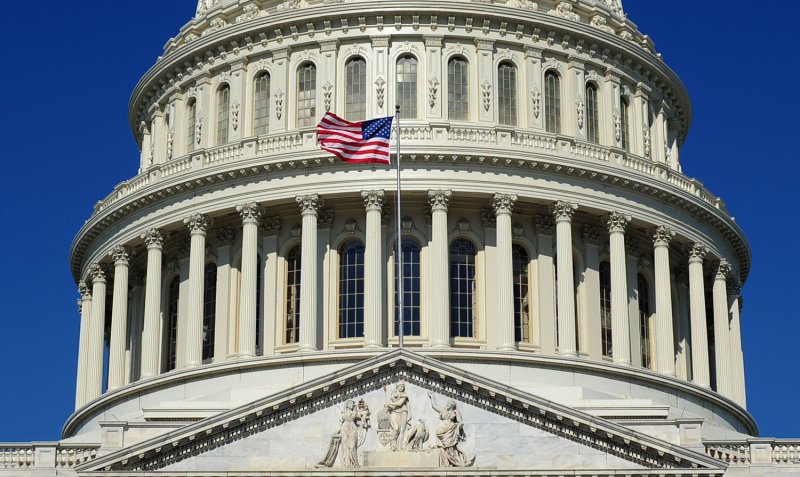The U.S. Capitol building is seen in Washington, D.C. on August 2, 2011. A panel of six Democrats and six Republicans from both chambers of Congress are required to propose $1.5 trillion in additional deficit cuts by Nov. 23. UPI/Kevin Dietsch |
License Photo
WASHINGTON, Aug. 3 (UPI) -- Congressional leaders have two weeks to name members of a 12-member panel to find ways within 100 days of cutting the U.S. budget deficit by $1.5 trillion.
The panel's six Democrats and six Republicans from both chambers of Congress are required by the budget and debt law President Barack Obama signed Tuesday -- a law that raises the government's borrowing limit $2.4 trillion and cuts $917 billion in federal spending -- to propose $1.5 trillion in additional deficit cuts by Nov. 23.
The savings can come from spending cuts and tax increases -- options lawmakers predicted Tuesday would be argued in fiery debates.
Once the panel makes its proposal, Congress must vote on the package without amending it by Dec. 23, the law states. Senate approval will take 51 votes instead of the usual 60 needed to avoid a filibuster, which would prevent the measure from being brought to a vote.
If the special panel deadlocks, or if Congress doesn't accept its recommendations, the debt-ceiling law would automatically impose $1.2 trillion in cuts on so-called discretionary spending programs, including the defense budget.
Social Security, Medicaid, military and civilian federal pensions, and most low-income programs would be off limits from the "trigger" spending cuts. Medicare cuts would be limited to provider payments.
Once the reductions are enacted, the federal debt limit would go up by at least another $1.2 trillion, which is expected to give the government enough borrowing authority to carry through 2012.
It was not clear early Wednesday how most members of the panel would be selected.
Senate Minority Leader Mitch McConnell, R-Ky., said he would interview applicants, but Senate Majority Leader Harry Reid, D-Nev., House Speaker John Boehner, R-Ohio, and House Minority Leader Nancy Pelosi, D-Calif., did not immediately outline their selection plans.
Each is to name three members to the panel.
Republican leaders said they would not include anyone who's willing to raise taxes, prompting Democratic leaders to threaten a hard line against cuts to Social Security and Medicare benefits, which could be considered by the panel but would not be automatically cut by the trigger, The Washington Post reported.
Reid told the Post he'd like to "put people on it who are willing to do entitlement cuts ... people with open minds." But the GOP's uncompromising stand against tax increases "makes it pretty hard for me," he said.
Some Republicans may be open to raising revenue if it comes by ending tax breaks instead of raising tax rates, The Wall Street Journal reported.
Obama said the new law required "that both parties work together on a larger plan to cut the deficit. And since you can't close the deficit with just spending cuts, we'll need a balanced approach where everything is on the table."
"Everyone is going to have to chip in. It's only fair," Obama said.















